Shifting Perspectives on Purchasing Open Source Software

Joe Occhionero
Apr 15, 2025
At FUTO, we want to make open-source software development sustainable. We believe that developers should be paid for their time and energy spent on their projects, and have the legal ability to prevent big tech from taking their work and profiting from it without proper compensation or attribution.
Is this just our perspective, or does the community feel similarly? To find out, we launched our first public surveys around FUTO’s SXSW 2025 conference this past March. We ran these for a month using self-hosted HeyForm , our YouTube channel, and other avenues like our website and word-of-mouth, gathering over 750 (~110 developers, ~600 consumers) anonymized responses. The result was a powerful echo of our core beliefs: over 94% of respondents indicated a willingness to pay for OSS.
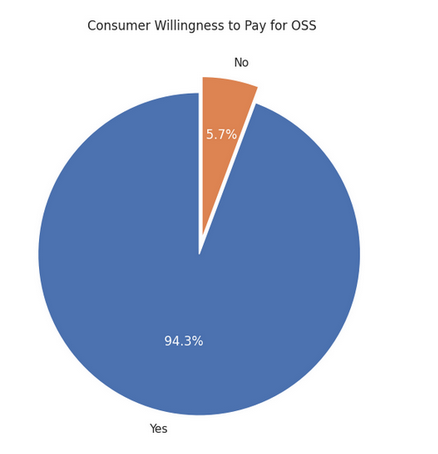
This data confirms we’re on the right track in redefining what building in open-source means today, creating a path for developers to support themselves and their projects sustainably in the modern age. However, community willingness to pay, while incredibly encouraging, doesn’t automatically solve the structural problems developers face. The current ecosystem can still leave creators vulnerable, facing situations exactly like this:
The Developer’s Dilemma
Imagine you’re an open-source developer, and on weekends you work on a small but successful FOSS product. What started as a passion project is now a second job that you wish you had more time for. To make matters worse, big tech noticed your project’s success and has already turned it into one of their product offerings, effectively eliminating any chance you had of turning this into your full-time career.
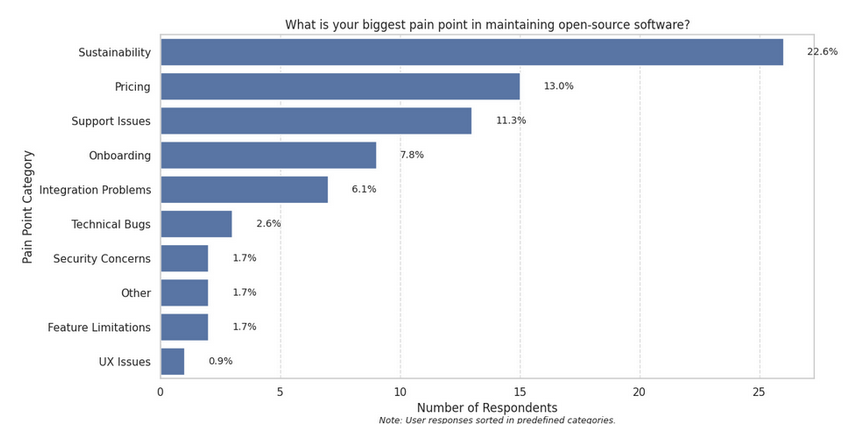
You’re not alone. Roughly 70% of our surveyed developers cited major pain points in running their OSS projects, and of those, about half were categorized as having major issues with the following:
- Sustainability (finding time and maintaining financial stability)
- Support (keeping up with user requests and troubleshooting).
- Pricing (figuring out fair compensation models without alienating potential customers)
And among projects that attempted to monetize, legal challenges and competition from alternatives emerged as common hurdles.
So, knowing developers face these challenges, what do customers see as preferred ways to pay and receive software?
Monetization Strategies: What Customers Actually Want
Our data shows that more than 80% of customers surveyed would pay once (as a pay-what-you-want and/or one-time purchase).
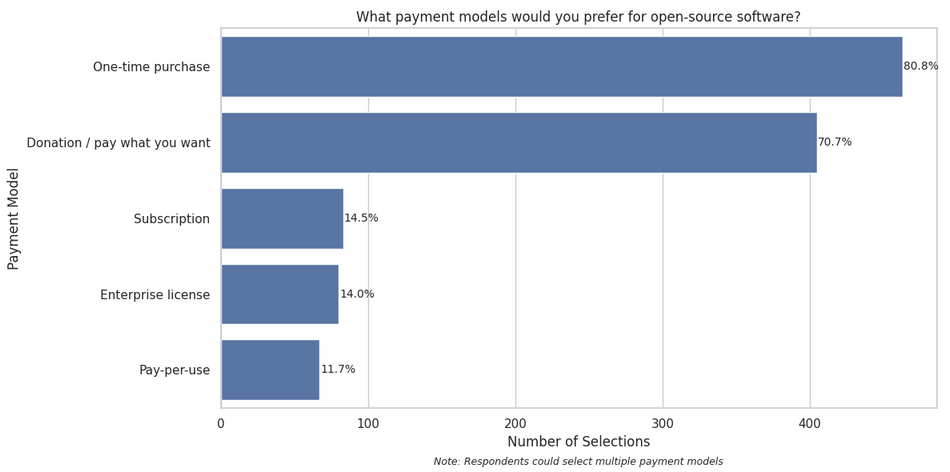
Yes, despite what many people assume, and while big tech frequently gravitates toward SaaS or subscription models as the route to sustainability, most customers and developers of OSS would strongly prefer the one-time payment approach. Why does this disconnect exist?
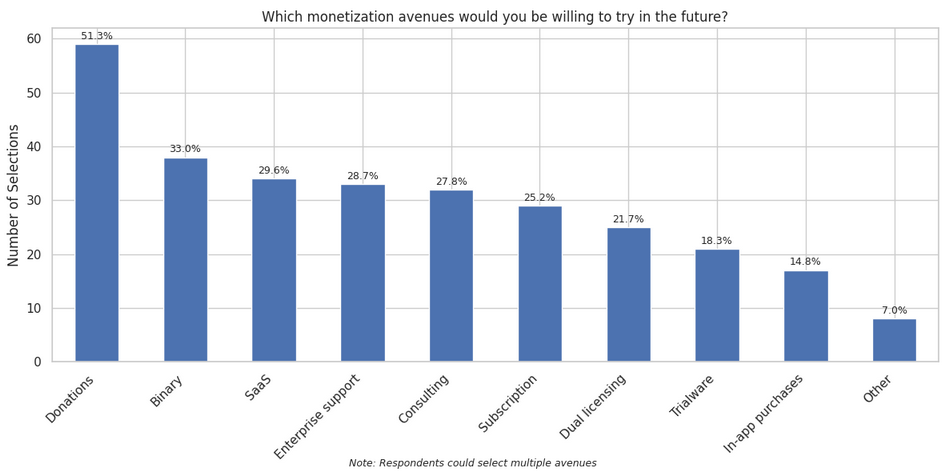
We believe it partially stems from subscription fatigue in an increasingly subscription-heavy digital economy. Insights from our survey comments suggest customers find managing recurring payments painful and exhausting. They also mention encountering friction with payment processing, especially dealing with international transactions, currency conversions, and regional tax rules. Furthermore, many prefer directing contributions toward specific features rather than funding general support. Ultimately, customers seem to value simplicity: pay once, download a compiled binary, and use the software without ongoing financial ties.
That said, recognizing this preference while also acknowledging developers’ need for sustainable income models is key. This is why at FUTO, we’re strongly encouraging core OSS offerings as self-hostable–perfectly suited for the preferred one-time purchase and binary distribution.
We believe developers can then bridge the gap towards recurring revenue by also offering optional, value-added services, such as a managed hosted version for customers who prefer convenience and are willing to subscribe. This hybrid approach respects the core user desire for simplicity while creating pathways for sustainability.
We understand the nuances of balancing customers preferences and developer sustainability aren’t easy, however. That’s why we’re continuing this work, exploring this topic further in upcoming interviews with survey participants who requested follow-up conversations.
The Price Point Sweet Spot
So, if customers prefer the one-time purchase model, how much are they actually willing to pay? We explored this by asking respondents to select their willingness-to-pay from several price bands for a hypothetical valuable OSS tool. Analyzing these selections revealed an average willingness to pay of approximately $18 USD (a conservative estimate, using the bottom of the selection band). Interestingly, digging deeper showed that those who self-identified as ‘frequent’ donors to open source projects leaned higher, averaging around $27 USD. It’s worth noting this group represented about 10% of our respondents, so consider that context when looking at this higher figure–your mileage may vary.
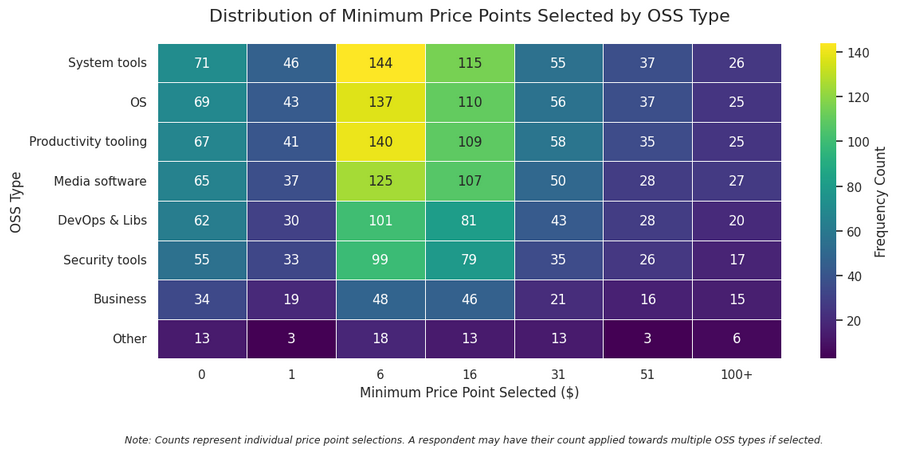
At the same time, our survey reveals what truly motivates customers to pay for open source projects. A clear roadmap leads the way (68.3%), with usability (63.5%) and funding transparency (59.8%) following closely behind. While communication, dedicated support, and contributor recognition scored lower, they still impact purchasing decisions. Conversely, the main factors deterring customers are ‘Affordability,’ ‘Abandonment,’ ‘Purchasing Pains,’ and other elements we’re still analyzing, but the message is clear: customers want to understand your project’s direction, find it easy to use, and know how their money will be spent.
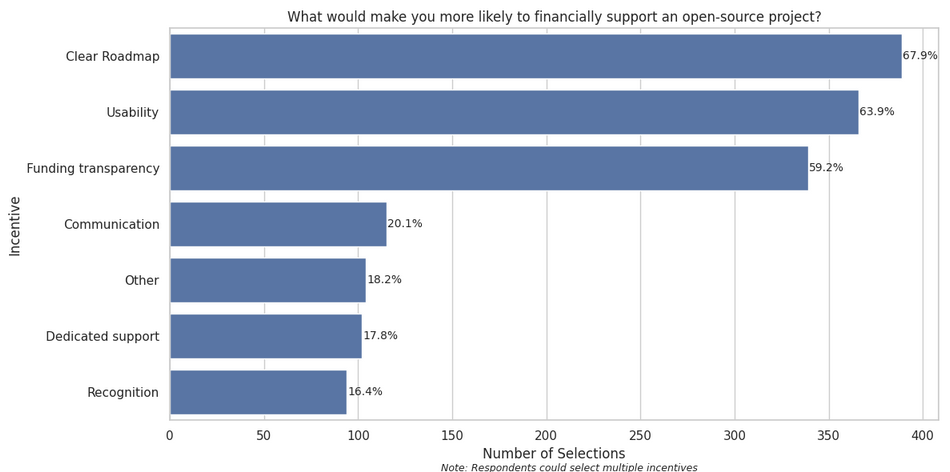
Here’s what we believe is critical though: if we, as customers, decide to “purchase” OSS, we need to shift expectations around what that means. When you “purchase” instead of “donate”, you’re supporting the project as it exists today, not buying promises of future features. Purchasing is about sustaining current value while enabling future development. Customers need to apply the same clear-eyed assessment they use with commercial software: is this valuable right now, and does its future direction justify ongoing support?
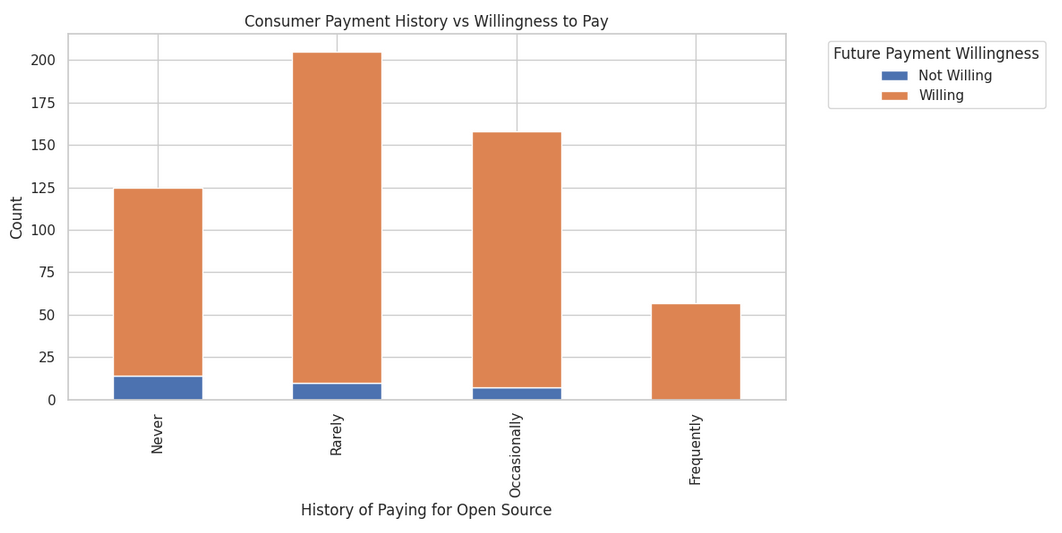
Protecting Your Work
So imagine you’re that developer again—but this time, you’re armed with this data on monetization strategies your customers actually embrace and ideas for building sustainably. You’ve got a successful project people love and are willing to pay for. But there’s still that nagging question: how do you keep big tech from simply taking your work and profiting from it without fair compensation?
This is a core challenge FUTO aims to address. We’ve developed the Source First licensing model designed to help developers establish fair terms that foster mutual respect between creators and users. Its principles aim to ensure developers retain appropriate control over their work and have the ability to require fair compensation, particularly from big tech looking to use the project.
While we strongly believe in this approach, we offer Source First as one of our contributions towards a more sustainable open-source future. It’s one option among many licensing strategies available to you. If you’re interested in exploring licenses built on these principles, a free resource with guidelines and model license options is available at sourcefirst.com for developers looking to establish clear and fair terms with their community.
Building the Tools for a Sustainable Future
Understanding the challenges and preferences is one thing; building the infrastructure to support developers is another. That’s why my team at FUTO is focused on FUTOcore, our upcoming software distribution project.
You’ve chosen a license like Source First to protect your work, and you know users are willing to pay via one-time purchases. But how do you easily sell and distribute your software, especially without getting bogged down in building payment systems, user authentication, or storefronts?
FUTOcore is our answer. We’re creating a dedicated platform–initially launching with a focus on Android apps–specifically designed for commercial open-source. Our goal is to support small teams, and turn their valuable projects into sustainable successes, contributing to a healthier software ecosystem.
To streamline the process further and handle essential software functions, FUTOcore will integrate with FUTOpay, our tailored billing solution, simplifying payment complexities, and FUTOauth, our authentication solution for managing user accounts securely. Further, we will be building telemetry that respects the user while allowing developers to get valuable insights. Together, these tools are designed to let you concentrate on building great software, not just the infrastructure around it.
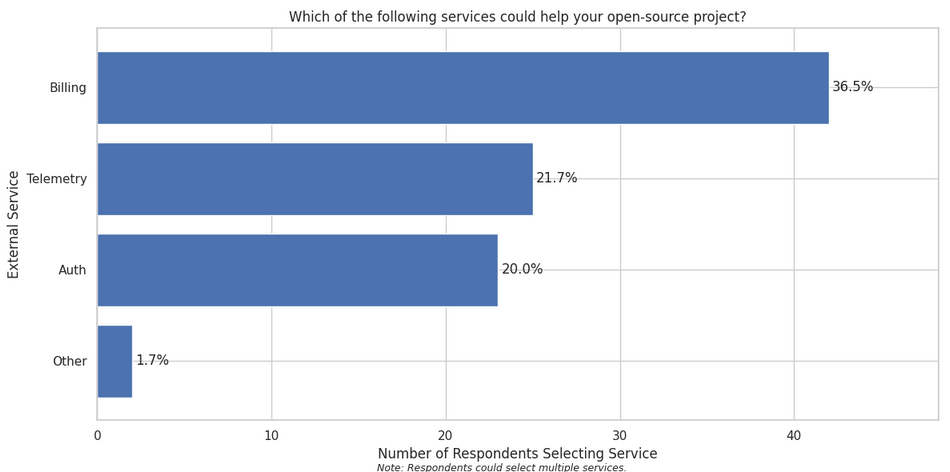
You can hear more about our overall vision for these tools and how they fit into our broader mission from one of our leaders, Adam Jesionowski, here .
Get Involved / Let Us Know
If you’re interested in learning more about how these approaches might work for your project, or if you found this research valuable and would like us to do more, please let us know!
Your feedback helps shape our direction. You can find me at [email protected] , connect with the wider FUTO community on our public Zulip, or reach out via FUTO’s social media channels.

